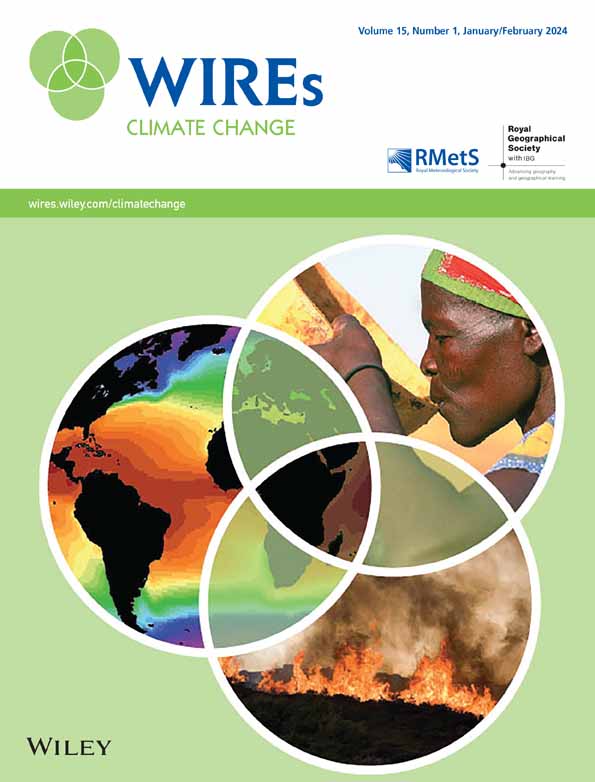对因气候变化导致的冰川消融而暴露的土地进行管理的必要性
IF 10.3
1区 环境科学与生态学
Q1 ENVIRONMENTAL STUDIES
引用次数: 9
摘要
到21世纪末,全世界的高山冰川将失去大部分体积,使高山生态系统和人类面临风险。冰川退缩后出现的新土地为生态和人类适应气候变化带来了一系列挑战。在这些新颖的前冰川景观中,生态演替和自然灾害与当地农业、水电生产、采矿活动和旅游业相互作用。研究强调了理解社会环境系统适应的重要性,但支持地方举措并将新的冰川前景观与生态、社会和文化保护机会联系起来的区域和全球管理工作是罕见的。这些新兴土地的特征反映了高山生态系统与社会政治历史的联系。在受冰川影响的系统中,这些生物物理系统和当地人口之间的相互依赖性、反馈和权衡往往被忽视。没有协调一致的战略来管理和预测这些不断变化的动态,同时肯定当地的做法和背景。有机会发起一场新的对话,围绕这些新颖的景观共同创建一个治理结构,并制定一个适合人类世时代的新框架。本文首先综合了冰川前景观中发生的快速社会环境变化。其次,我们认为有必要将“自下而上”和“自上而下”的方法相结合,对冰川前景观进行可持续管理。最后,我们建议建立一个具有政策相关目标的跨学科倡议,以围绕冰川前景观的治理和可持续管理进一步开展对话。我们呼吁加强行动者、部门和区域之间的合作,支持多尺度和综合方法。本文章由计算机程序翻译,如有差异,请以英文原文为准。
The need for stewardship of lands exposed by deglaciation from climate change
Alpine glaciers worldwide will lose most of their volume by the end of the 21st century, placing alpine ecosystems and human populations at risk. The new lands that emerge from retreating glaciers provide a host of challenges for ecological and human adaptation to climate change. In these novel proglacial landscapes, ecological succession and natural hazards interplay with local agriculture, hydroelectric production, mining activities, and tourism. Research has emphasized the importance of understanding adaptation around socio‐environmental systems, but regional and global management efforts that support local initiatives and connect novel proglacial landscapes to ecological, social, and cultural conservation opportunities are rare and nascent. The characteristics of these emerging lands reflect the nexus of alpine ecosystems with socio‐political histories. Often overlooked in glacial‐influenced systems are the interdependencies, feedbacks, and tradeoffs between these biophysical systems and local populations. There is no coordinated strategy to manage and anticipate these shifting dynamics, while affirming local practices and contexts. There is an opportunity to initiate a new conversation and co‐create a governance structure around these novel landscapes and develop a new framework suitable to the Anthropocene era. This article first synthesizes the rapid socio‐environmental changes that are occurring in proglacial landscapes. Second, we consider the need for integrating “bottom‐up” with “top‐down” approaches for the sustainable management of proglacial landscapes. Finally, we propose establishing a transdisciplinary initiative with policy‐related goals to further dialogues around the governance and sustainable management of proglacial landscapes. We call for increased cooperation between actors, sectors, and regions, favoring multiscale and integrated approaches.
求助全文
通过发布文献求助,成功后即可免费获取论文全文。
去求助
来源期刊

Wiley Interdisciplinary Reviews: Climate Change
METEOROLOGY & ATMOSPHERIC SCIENCES-
CiteScore
20.00
自引率
2.20%
发文量
58
审稿时长
>12 weeks
期刊介绍:
WIREs Climate Change serves as a distinctive platform for delving into current and emerging knowledge across various disciplines contributing to the understanding of climate change. This includes environmental history, humanities, physical and life sciences, social sciences, engineering, and economics. Developed in association with the Royal Meteorological Society and the Royal Geographical Society (with IBG) in the UK, this publication acts as an encyclopedic reference for climate change scholarship and research, offering a forum to explore diverse perspectives on how climate change is comprehended, analyzed, and contested globally.
 求助内容:
求助内容: 应助结果提醒方式:
应助结果提醒方式:


